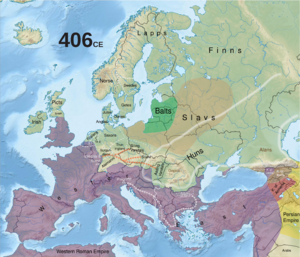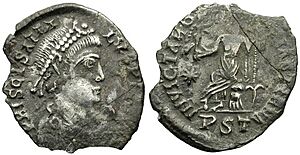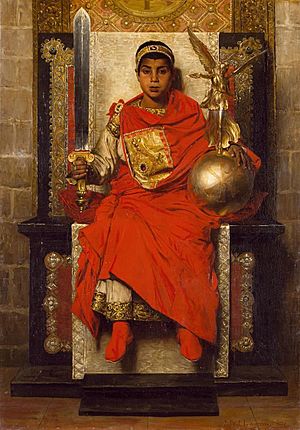Heraclianus facts for kids
Quick facts for kids Heraclianus |
|
|---|---|
| Usurper of the Western Roman Empire | |
| Reign | Summer 412–Spring 413 |
| Predecessor | Honorius |
| Successor | Honorius |
| Died | 7 March 413 Carthage |
Heraclianus (died March 7, 413) was a Roman governor. He became a rebel leader against Emperor Honorius in the Western Roman Empire from 412 to 413. Honorius had first given Heraclianus his power.
Heraclianus helped stop a rebellion led by Priscus Attalus. But then, Heraclianus decided to start his own rebellion. He invaded Italy, but he was either defeated in battle or captured and put to death.
Heraclianus's Early Career
Heraclianus first became known for helping Emperor Honorius. He helped remove a very powerful general named Stilicho in 408 AD. Honorius rewarded Heraclianus for this. He made him the Comes Africae, which means Governor of the important Roman province of Africa. This happened in late 408 AD.
Some historians say Heraclianus went to Africa in 409 AD. Others say he took over from a governor named Bathanarius. Bathanarius was related to Stilicho.
Standing Up to Priscus Attalus
In 409 AD, a man named Priscus Attalus rebelled against Emperor Honorius. Attalus had the help of the Visigoths, a powerful group led by King Alaric I. Attalus set up his own government in Rome. Honorius's main city was Ravenna.
Heraclianus stayed loyal to Honorius. He controlled the ports in Africa very strictly. This stopped food from reaching Rome. He wanted to starve Attalus's forces out of the city.
Attalus did not send an army to Africa at first. He sent only one person, hoping to convince Heraclianus to give up. But Heraclianus had this person killed. He sent the money found on the envoy to Honorius. This money was meant to bribe the people in Africa.
Alaric, the Visigoth king, wanted to send an army to Africa. But Attalus did not agree. Because of this, Alaric removed Attalus from power in 410 AD. Heraclianus likely had the support of the local people in Africa. This was because Emperor Honorius had recently allowed the Donatists to practice their religion freely. The Donatists were a Christian group popular in Africa.
Heraclianus's Rebellion
In 412 AD, Heraclianus was chosen to be a consul for the year 413. A consul was a very high official in Rome. But he was probably never officially appointed. Heraclianus felt very powerful. His son-in-law, Sabinus, encouraged him. Heraclianus then rebelled against Honorius. He declared himself Augustus, which meant he claimed to be emperor.
His first action was to stop the food supply to Rome again. He had done this successfully against Priscus Attalus. Next, he gathered many ships and soldiers. He planned to invade Italy. Emperor Honorius declared Heraclianus and his supporters to be enemies of the State. He ordered their death in an official statement on July 7, 412 AD.
In 413 AD, Heraclianus arrived in Italy with a large army. He came to fight Honorius. There are two main stories about how he died:
- One story says Heraclianus marched towards Rome. But he became scared when a general named Marinus arrived. He left his army and ran away to Carthage. There, he was put to death on March 7.
- Another story says Heraclianus was defeated in a big battle in a place called Utriculum. Many soldiers died in this battle. After the defeat, he fled to Carthage. There, people sent by Honorius put him to death.
Sabinus, Heraclianus's son-in-law, escaped to the eastern part of the Roman Empire. But he was later sent back and then sent away from the empire.
Heraclianus's name is not on the official list of Roman consuls. Honorius probably cancelled his appointment. Heraclianus's actions as a rebel were cancelled. His wealth, including a lot of gold and land, was taken away. It was given to another important general, Flavius Constantius.
Some people accused Heraclianus of being unfair to people. He was said to have treated some noblewomen badly. They had fled from Rome to Carthage during Attalus's rebellion. He reportedly held them until a large payment was made.
 | John T. Biggers |
 | Thomas Blackshear |
 | Mark Bradford |
 | Beverly Buchanan |




